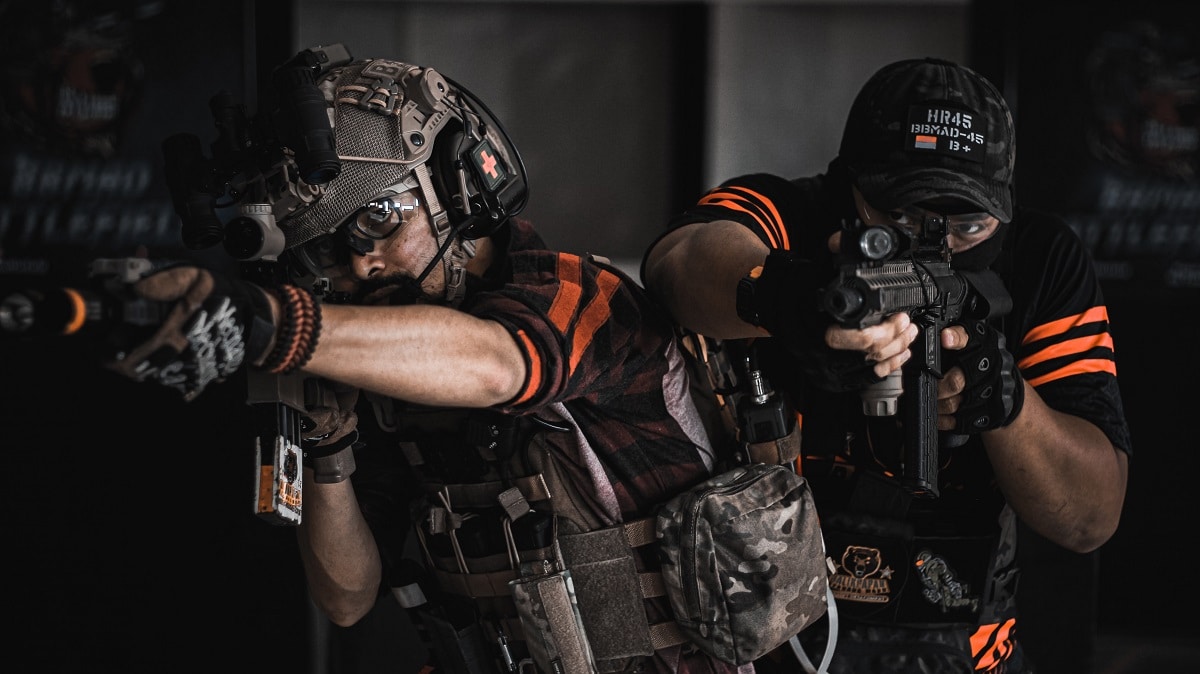
What Is the U.S. Police Hiring Process?
The road to becoming a police officer is a competitive one with many trials along the way. There is an extensive hiring process that potential police officers have to go through to be considered for hire. Physical, psychological, and medical checks are necessary parts of the assessment.
Overall, there are usually more applicants than there are available spots for hire. Therefore, it is essential to find a way to stand out amongst the crowd and pass each part of the hiring process with flying colors.
In this guide, you will find more information about the police hiring process, how you can prepare for it, and essentially how to pass the assessments.
Table of Contents
The Requirements to Become a Police Officer
To become a police officer in the U.S., you will have to be a U.S. citizen with a valid driver’s license. You will also have to be 18 at the very least, but the age requirements will vary between states as well. Some states will require you to have a high school diploma or G.E.D., while others may require you to have some college education as well.
As far as vision goes, it is acceptable if you have to wear contacts or glasses. Color blindness will be a factor that will be evaluated by the police station since it is a condition that is severe for some and mild for others.
Hence, being able to move forward while being colorblind will depend on the severity of your condition. Most stations will favor applicants with 20/20 visions as they have little to no risks associated with their eyesight.
What Is the Police Hiring Process?
The police hiring process is an assessment that consists of several sections that will evaluate applicants based on physical abilities, physiological readiness, and much more.
As you know, being a police officer is a physically and mentally demanding job, and the assessment is a way to ensure that applicants are prepared to endure the hardships that come with being a police officer.
There are more than nine elimination stages in the police hiring process. You should aim to excel in every stage if you want to secure your place as an applicant.
- Application
- Police written exam
- Oral board interview
- Physical test
- Polygraph test
- Psychological exam
- Background
- Medical exam
- Drug test
- Interview with Chief
Passing each section of the hiring process will prove your eligibility to become a police officer and move forward with your career path. Bear in mind that the hiring process will vary depending on the states and the police stations. There are also basic requirements you will have to fulfill to even be considered for hire.
Each stage is meant to assess you on a variety of skills and readiness, and performing poorly may reflect badly on your suitability as a candidate. After all, stations want to hire the most capable applicants to become police officers.
1. Application
The first step in the assessment is the application. You will need to fill out an entire application packet that will include questions about your background, personal information, work experience, education, and more.
You should not lie in your answers or in the polygraph section later on. Ultimately, it is crucial to understand the importance of honesty and integrity in your role as a police officer.
Be sure to keep an extra copy of your application packet just in case. Some applications can get lost within the system, so you should hold onto the backup packet in case you need to resend it. This way, you will not have to redo the entire application process.
2. Police Written Exam
The second step is the police written exam. The police written exam is crucial to evaluating your foundational skills and common sense. This section of the assessment has questions revolving around math, logic, reading, spatial reasoning, and other subjects.
These are many of the skills that police officers will be expected and required to have in order to carry out their jobs. However, be aware that the actual content and number of questions will vary across the country.
3. Oral Board Interview
The third step is the police oral board interview. The oral section of the assessment can be considered pretty intimidating, so it is best to show up confident and able to act and react quickly and efficiently. This will usually be the step that many high-ranking officers will use to determine whether or not you are fit for hire.
As such, it is possible that many applicants will be eliminated in this stage alone.
You should dress well and be prepared to answer any questions they have for you. Don’t be afraid to ask your own questions as well. Keep your answers firm and true. Many of the questions will be based on scenarios and they will evaluate your answers accordingly.
One of the most important things to know about this section is the mission statement of the agency. Candidates who know the mission statement by heart upon taking part in the oral exam are more likely to pass.
4. Physical Test
The fourth step is the police physical test. This portion of the assessment is meant to evaluate your physical capabilities. The physical test will include push-ups, sit-ups, a 1.5-mile run, and (in some agencies) a 300-meter run.
Usually, the physical requirements will vary between male and female applicants. Either way, you will need to be able to keep up with intense physical training even after this portion of the police hiring process is over. The best way to prepare for this part is to maintain an exercise routine and a healthy diet.
5. Polygraph Test
The fifth step is the polygraph test that will evaluate your voice and overall sincerity. The people running the interview will be able to tell when you are telling the truth or when you are lying, so it is best to keep every answer truthful. This section will consist of irrelevant questions, relevant questions, and control questions.
The irrelevant questions will be something like “what is your name?”, “how tall are you?” or something along those lines. The relevant questions will ask you questions regarding how you answered other parts of the assessment or questions that will affect how you will be evaluated overall.
The control questions are questions in which the interviewers will expect you to have a little white lie every now and again, but it will not count too heavily upon your qualifications.
After repeating the series of questions a few times, they will look at the results based on the polygraph operator and determine whether or not your answers were truthful and consistent.
You should take your time to consider your answers instead of rushing to find one. Some of the polygraph questions may even contain some parts that you have already answered on your application to see if the answers have changed or remained the same.
6. Psychological Exam
The sixth step is the police psychological exam. This part will evaluate your psychological behavior and help determine whether or not you are psychologically capable of becoming a police officer.
You will be evaluated through a written personality test and an interview with an expert psychologist. The written test will consist of 400-600 questions that may vary depending on the agency.
Afterward, you will meet with a psychologist to discuss your background, education, emotional reactions, and many other things that will be involved with your own personal psychology.
This section will check to see if you have any aggressive behaviors, concerns, or inner psychological issues that need to be addressed. It is possible to prepare for this portion of the assessment by looking at online study guides like Job Test Prep.
Most of it, however, is based on your own personal experiences and behaviors and there are right and wrong answers to these questions. This section could very well make or break your chances of obtaining a job as a police officer.
7. Background Check
The seventh step is the background check. This involves the police doing a thorough background check on you to determine whether or not you will be capable of moving forward within the hiring process.
The entire investigation can take about six weeks to a year, depending on how much there is to investigate.
During this process, they will usually reach out to your colleagues, family members, teachers, past employers, and many other people who have been a part of your upbringing to gather data about how you were growing up.
They will also check to see if you have a criminal background, look at the details of your educational and employment background, and even your driving record.
There are plenty of things that could prevent you from moving forward, such as past criminal charges, drug use, falsified information, dishonorable discharge from the military, and many other things.
Things like that can immediately disqualify you from becoming a police officer and can get you in serious trouble if you lie about or omit this information.
Smaller factors that could put a dent in your path but can still be changed can be minor arrests or bad credit scores. You can wait until you have things like that sorted out before taking part in the assessments.
The important thing is that you are capable of owning up to your mistakes and fixing anything that can be fixed to put you in good standing with your future agency.
8. Medical Exam
The eighth step is the medical exam. You will go through a series of medical assessments to determine whether or not you will be in good enough health to be a police officer. Vision tests, hearing tests, and vital sign tests will be a few of the many procedures you will have to expect in the medical exam portion of the hiring process.
Be prepared that certain health conditions can disqualify you from becoming a police officer, and many of them are completely unavoidable.
9. Drug Test
The ninth and final step is the drug test. Agencies will require you to provide hair or urine samples in order to detect traces of drugs within your system. Many agencies use hair samples because they can detect drug use from many years back.
For this purpose, you may not want to apply to become a police officer if you have a prior history of even minor drug use, especially if it is more recent.
10. Interview With the Chief
The interview with the chief of the agency is not always a compulsory part of the hiring process, but it will give your superior officers a better understanding of you as a candidate. Show up well dressed and confident and by this stage, you should have no problems succeeding with the interview.
Sample questions may include:
- How often do you consume alcohol?
- Have you ever committed any minor crimes?
- Do you have a history of getting into fights?
How Do I Prepare for the Hiring Process?
There are many sections involved in the police hiring process with a variety of skills being carefully evaluated. Taking plenty of time to prepare yourself beforehand will help you be more ready for test day, boosting your confidence and helping you know what to expect from the assessments.
Job Test Prep has online study guides and practice police exams that will help you prepare. The questions will be relevant to the assessment questions and can also help you study how to handle different situations.
Instead of arriving for your exams not knowing what to expect, be sure to study the smart way and get familiar with the questions on Job Test Prep.
Conclusion
Police work is a competitive field that requires strict assessments, as well as good moral, psychological, and physical standing as an individual. If you want to secure your career as a police officer, you will need to make the necessary preparations and remain confident if you wish to pass each step of the hiring process.
Job Test Prep has all the resources to help you prepare and tackle your police exams effectively so be sure to have a look at their police exam practice to give you the best chance of doing well.
Sarah is an accomplished educator, researcher and author in the field of testing and assessment. She has worked with various educational institutions and organisations to develop innovative evaluation methods and enhance student learning. Sarah has published numerous articles and books on assessment and learning. Her passion for promoting equity and fairness in the education system fuels her commitment to sharing insights and best practices with educators and policymakers around the world.






